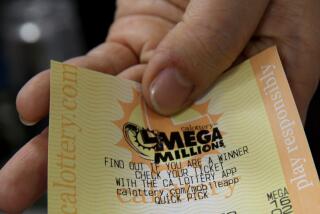MTA to Proceed With Adjusted Bus Fare Hike : Transit: Agency will raise price to $1.35 and sell monthly passes for $49 instead of $60. The action is temporary until a lawsuit is settled.
- Share via
The Metropolitan Transportation Authority received approval Wednesday to proceed, at least temporarily, with a long-delayed increase in bus fares from $1.10 to $1.35, effective Feb. 1.
The transit agency will also sell monthly bus passes for $49, instead of the $60 authorized by a federal judge last week, under an agreement reached between the parties in a lawsuit over the MTA’s spending policies.
The first fare increase in six years, which had been blocked since September, will remain in effect until U.S. District Judge Terry J. Hatter Jr. rules on the lawsuit.
The suit accuses the nation’s second-largest transit agency of discriminating against minority and poor bus riders by pursuing costly rail projects that largely benefit affluent white commuters. The trial is not expected to begin before late spring.
Citing the adjusted price for passes, activists praised the temporary settlement. Eric Mann, director of the Labor / Community Strategy Center, the lead plaintiff in the lawsuit, called the agreement a victory for the transit-dependent poor.
*
The MTA had proposed to eliminate the passes, used by about half of its riders. The passes are popular because they allow unlimited rides and save passengers from fumbling for change.
“I don’t want to pretend it’s an unequivocal victory,” Mann said, “but for those transit-dependent who use the bus the most, it’s a straight-out victory.” He said his group will continue to fight for reduced fares during the trial.
The agreement--described by a transit official as a “forced marriage”--was approved by the MTA board during a closed-door meeting Wednesday and later ratified by U.S. District Judge Consuelo B. Marshall.
It came a week after Hatter left both sides unhappy with his decision to keep the lower fare for cash-paying customers but allow the transit agency to raise the monthly passes from $42 to $60.
The plaintiffs--who agreed to an increase in the price of passes to $49--contended that the transit-dependent poor who make 80 or more bus trips a month would be forced to cut back on travel because they could not afford the $60 passes.
Mann said Wednesday that his organization will lead a campaign to promote the use of bus passes.
“It was more important to get an affordable pass,” said plaintiffs’ attorney Constance L. Rice of the NAACP Legal Defense and Educational Fund.
“We will beat the drums to make sure the tokens are available,” she added, referring to MTA’s promise to increase the availability of 90-cent tokens, which can be used in lieu of paying the higher fare.
“This is a necessary step toward returning the MTA to a position of fiscal stability,” said county Supervisor Mike Antonovich, who serves as MTA chairman. MTA officials have contended that the fare increase is imperative to pluck the agency out of a sea of red ink.
The MTA has also agreed to put off a proposal to increase the fare for passengers traveling between Long Beach and Los Angeles on the Blue Line from $1.10 to $2.35. Instead, the fare will go up to $1.35.
Other changes, effective Feb. 1: express charges will increase from 40 cents to 50 cents; the cost of an express stamp will rise from $12 to $15; passes will be $12 for the disabled and elderly, up from $10, and for the blind, who have ridden for free; passes for schoolchildren will increase from $18 to $20, and passes for college and vocational students will rise from $25 to $30. Transfers will remain 25 cents.
More to Read
Sign up for Essential California
The most important California stories and recommendations in your inbox every morning.
You may occasionally receive promotional content from the Los Angeles Times.











